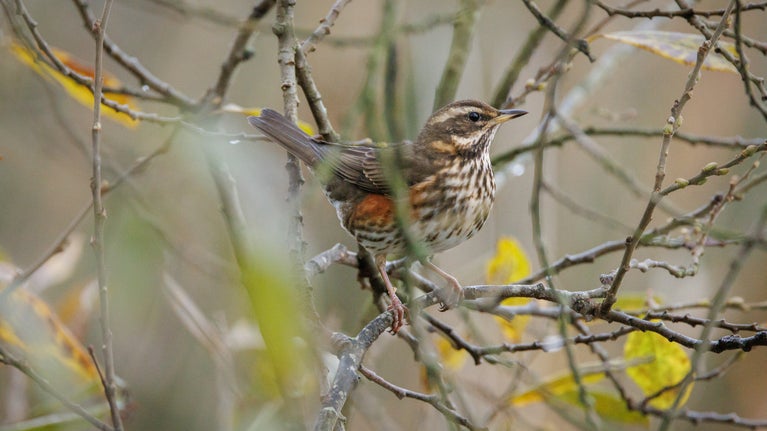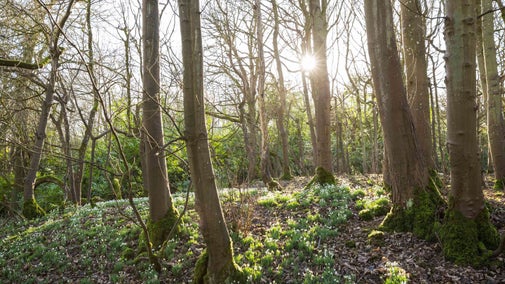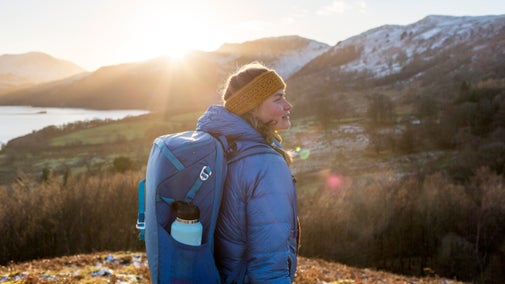
Discover more at Kinder, Edale and the High Peak
Find out how to get to Kinder, Edale and the High Peak, where to park, the things to see and do and more.

From far-reaching views across the Peak District to natural rock formations and important wildlife habitats, there’s lots to see at Kinder, Edale and the High Peak. Look out for these seasonal highlights on your next walk, bike ride or run through the Peak District.
Among the heather-clad moors and gritstone tors of Kinder, Edale and the High Peak, there are lots of natural features to look out for in the changing landscapes.
Top places to see include the famous Snake Pass gliding between the peaks, and Alport Castles, an eroded rock face created by landslide in the Alport Valley.
Kinder Scout is the highest point in the Peak District, where you’ll find countryside views, remote moorland, gritstone rock formations and Kinder Downfall, a waterfall that often freezes in winter. Follow in the footsteps of the mass trespass of 1935 at Kinder Scout, where hundreds of protestors paved the way to allow more access to open countryside.
Please note that parking in the Peak District is limited, and we encourage all visitors to travel by public transport where possible.
Throughout the year we hold guided walks and a range of other activities to help you explore the area. You can find out about our upcoming events here.
Kinder Scout is a National Nature Reserve, making it an important habitat for wildlife and biodiversity. Kinder has been used by the National Trust, the Peak District National Park Authority and the Moors for the Future Partnership as a demonstration site for moorland restoration techniques for many years.
Many of today’s widely used techniques for gully blocking and bare peat restoration were developed on Kinder Scout and surrounding National Trust owned moorland.
National Nature Reserves are open to the public, and we welcome our visitors to enjoy them freely whilst looking after this special place that you love to escape to.
The High Peak landscape makes the perfect backdrop for winter adventures and refreshing walks to energise you through the colder months.
Discover views over Edale Valley and the Derwent Moors from the heights of Mam Tor, enjoy a circular walk around Kinder Reservoir, or be blown away by a windswept walk on the Kinder plateau. Bring along an OS map to test your navigational skills and find the quietest, most peaceful walks this winter. Don’t forget to plan your walk before you leave home and be prepared for all weathers. It can get very brisk and windy in the peaks!

Wildlife spotters have come to the right place. Here are some winter visitors to look out for during your visit.
In autumn, many birds migrate to warmer climates, but there are still plenty of winged visitors to Kinder, Edale and the High Peak as the weather turns colder.
At Ladybower Reservoir, whooper swans are regular winter visitors, enjoying the cool waters. Look out for waxwings, recognisable by their crest and their yellow and red-brown tail feathers. They’re often seen in conifer plantations around the edge of the moors, feeding on rowan berries.
Another regular visitor is the redwing, mostly found in hedgerows and fields. It is the smallest UK thrush and can often be seen alongside fieldfares – another member of the thrush family – usually seen in the Peak District from October until March. Their favourite food is the hawthorn berries that emerge in early autumn.
Mountain hares are a popular sight in the High Peak, and you may be able to see them in autumn and winter, when their camouflage coat changes to winter white.
It’s hibernation season for hedgehogs and frogs, who spend the autumn building up fat reserves before their slumber. Frog hibernation is dependent on the weather, and in milder spells during winter they’ve been known to emerge from hibernation.
As autumn fades, so do the golden-red leaves – but you can still find lots of fungi around the High Peak, such as the birch bracket and horse’s hoof bracket fungi. The latter is also known as Tinder fungus and occurs most commonly on birch and beech trees, so-called because it looks like a horse’s hoof growing out of the tree.
Be sure to take photos of the fungi and leave them in the ground to do their important job of helping to recycle nutrients into the soil, so that other plants, wildflowers and trees can thrive.
The woodlands in the Peak District are home to a variety of native trees, offering diversity for insects, birds and mammals. Here are some to look out for during your visit.

Find out how to get to Kinder, Edale and the High Peak, where to park, the things to see and do and more.
Walking with your dog is a great way to enjoy the scenic walks and stunning views of the Peak District. Here is some information and guidance about visiting the area with your dog.

Discover the best views of the Peak District on a refreshing walk or bike ride through Kinder, Edale and the High Peak in Derbyshire.

Discover how the Peak District became the UK’s first National Park and uncover the turbulent history of this vast and peaceful landscape.

Planning an outdoor event in the Peak District? Find guidance for organising events on National Trust land here, along with top tips for submitting an application.

Discover more about the work we’re doing to restore, protect and improve to landscape at Kinder, Edale and the High Peak, and find out how you can help us look after the land.

Plan a visit to one of the special countryside places in our care and discover the benefits of being in the great outdoors. Pack your walking boots and get ready to explore woodlands, valleys and rivers.

Find out about the extensive countryside and woodland places to explore in the Peak District and Derbyshire, from rugged peaks to wide expanses of moorland.

Explore some of the finest landscapes in our care on coastal paths, accessible trails, woodland walks and everything in between. Find the best places to walk near you.
